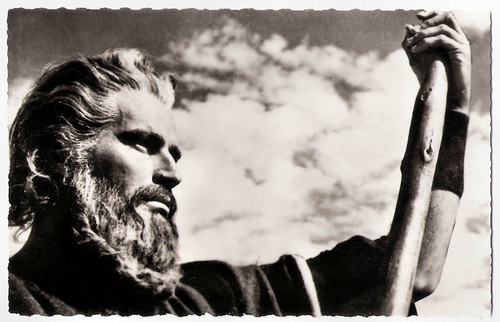
French postcard by Editions P.I., Paris, no. 830. Offered by Les Carbones Korès "Carboplane". Photo: Paramount. Publicity still for The Ten Commandments (Cecil B. DeMille, 1956).
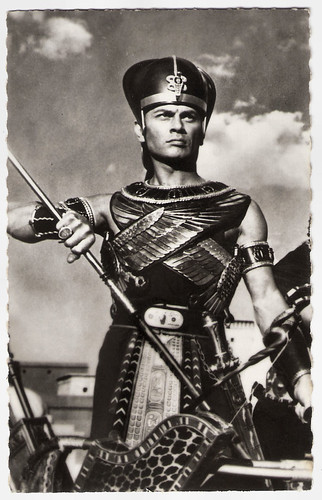
French postcard by Editions P.I., Paris, no. 831. Photo: Paramount. Publicity still for The Ten Commandments (Cecil B. DeMille, 1956). For his pursuit of the Israelites, Yul Brynner in his role as Rameses II wears the blue Khepresh helmet crown, which the pharaohs wore for battle.
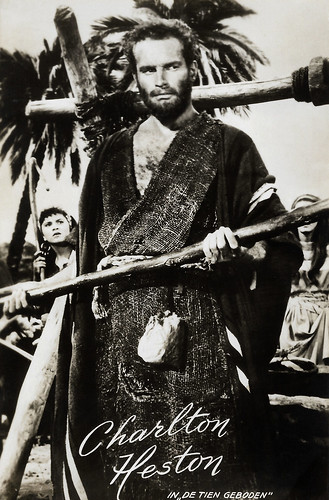
Belgian postcard by Papeterie, Bruxelles no. 3847. Photo: Paramount. Charlton Heston in The Ten Commandments (Cecil B. DeMille, 1956).
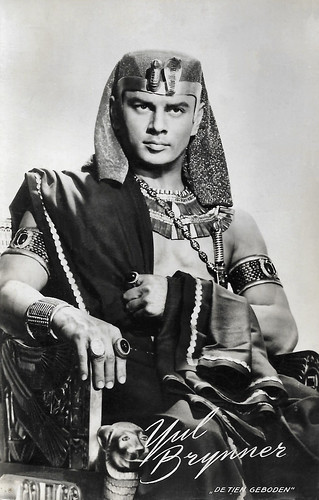
Dutch postcard by Uitg. Takken, no. AX 3871. Photo: Paramount. Publicity still for The Ten Commandments (Cecil B. DeMille, 1956).
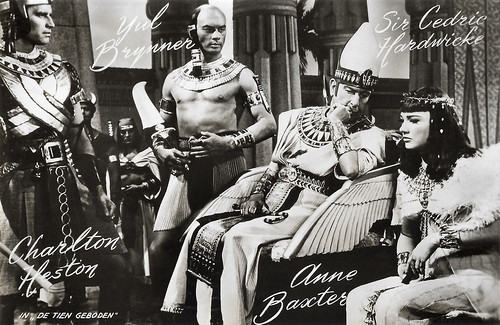
Dutch postcard by Uitg. Takken, no. AX 3881. Photo: Paramount. Publicity still for The Ten Commandments (Cecil B. DeMille, 1956) with Charlton Heston, Yul Brynner, Sir Cedric Hardwicke and Anne Baxter.
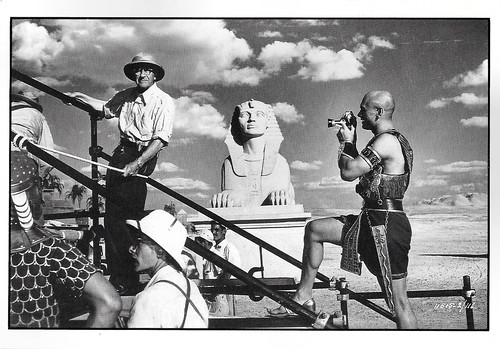
French postcard in the Entr'acte series by Éditions Asphodèle. Mâcon, no. 004/2. Photo: Collection B. Courtel / D.R. Cecil B. DeMille and Yul Brynner on the set of The Ten Commandments (Cecil B. DeMille, 1955). Caption: Yul Brynner, film actor and photo enthusiast, takes a break to photograph director Cecil B. DeMille.
Put on Earth to do God’s will
Based on the Holy Scriptures, with additional dialogue by several other hands, The Ten Commandments (Cecil B. DeMille, 1956) tells the story of Moses, leader of the Hebrews, considered to have been a prophet by Jews, Christians and Muslims. He is thought to have lived in Egypt, in or around the 14th century BC.
The older he became, the more Cecil B. DeMille was convinced that he had been put on Earth to do God’s will. He decided to remake The Ten Commandments, in response, he claimed, to scores of imploring letters: “The world needs a reminder, they said, of the Law of God.”
Charlton Heston, who had previously worked with DeMille in The Greatest Show on Earth (Cecil B. DeMille, 1952), won the part of Moses after he impressed DeMille at his audition with his knowledge of ancient Egypt. The film follows Moses from the time he was discovered in the bull rushes as an infant by the Pharaoh's daughter, to his long, hard struggle to free the Hebrews from their slavery at the hands of the Egyptians.
Heston was also chosen to be the voice of God in the form of a burning bush, toned down to a softer and lower register. As soon as Heston announced to DeMille that his wife Lydia was pregnant, Heston's newborn son, Fraser (1955), was cast by DeMille. Fraser Heston was three months old during filming.
Edward G. Robinson was cast as Dathan, Yvonne De Carlo as Sephora, Debra Paget as Lilia, and John Derek as Joshua. The film features Sir Cedric Hardwicke as Sethi, Nina Foch as Bithiah, Martha Scott as Yoshebel, Judith Anderson as Memnet, and Vincent Price as Baka. For the large crowd shots, at least 14,000 extras and 15,000 animals were used.
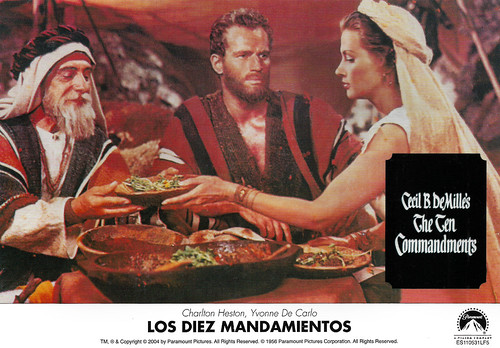
Spanish card, 2004. Photo: Paramount. Charlton Heston and Yvonne De Carlo in The Ten Commandments (Cecil B. DeMille, 1956).

Spanish card, 2004. Photo: Paramount. Charlton Heston and Anne Baxter in The Ten Commandments (Cecil B. DeMille, 1956).

Spanish card, 2004. Photo: Paramount. Charlton Heston in The Ten Commandments (Cecil B. DeMille, 1956).
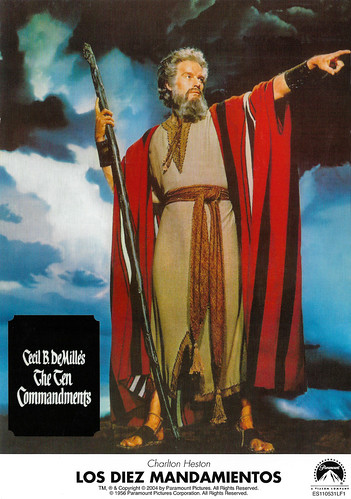
Spanish card, 2004. Photo: Paramount. Charlton Heston in The Ten Commandments (Cecil B. DeMille, 1956).
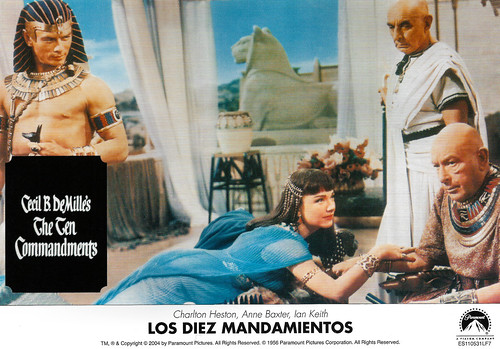
Spanish card, 2004. Photo: Paramount. Charlton Heston, Anne Baxter and Ian Keith in The Ten Commandments (Cecil B. DeMille, 1956).

Spanish card, 2004. Photo: Paramount. Charlton Heston and Yul Brynner in The Ten Commandments (Cecil B. DeMille, 1956).

Spanish card, 2004. Photo: Paramount. Charlton Heston in The Ten Commandments (Cecil B. DeMille, 1956).
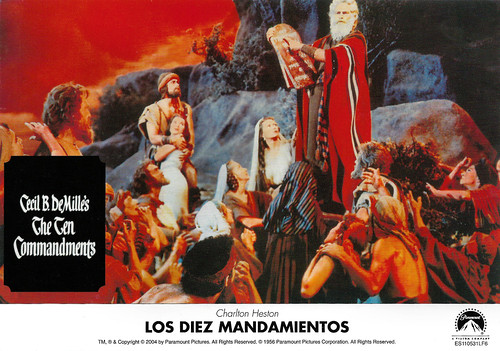
Spanish card, 2004. Photo: Paramount. Charlton Heston in The Ten Commandments (Cecil B. DeMille, 1956).
The most eventful 219 minutes ever recorded
In 1957, The Ten Commandments was nominated for seven Oscars, including Best Picture. John P. Fulton, head of the special effects department at Paramount, won the Academy Award for his effects. Fulton’s effects included the building of Sethi’s Jubilee treasure city, the Burning Bush, the fiery hail from a cloudless sky, the Angel of Death, the composites of the Exodus, the Pillar of Fire, the giving of the Ten Commandments, and the highlight, the parting of the Red Sea.
The production, at the time incredibly expensive with a budget of $13 million, grossed $122.7 million at the box office. It was re-released in 1966 and 1972, and one more time in 1989. The liberties taken with the biblical story of Exodus nor its nearly four-hour length has had any effect on its popularity. According to Guinness World Records, in terms of theatrical exhibition, The Ten Commandments (1956) is the seventh most successful film of all time when the box office gross is adjusted for inflation.
During production, DeMille had customarily spread out prints of paintings by Lawrence Alma-Tadema to inform his set designers of the look he wanted to achieve. However, in terms of accuracy about Moses and his time, The Ten Commandments is patchy. Alex von Tunzelmann in The Guardian: “It's amazing how much the fashions of New Kingdom Egypt seem to resemble those of 1956. DeMille can just about be forgiven for the makeup because ancient Egyptians did indeed paint their eyelids, lips and nails, but he is pushing it by dressing dancing girls in fluorescent green bikinis. At least the spectacular scenes filmed on location in Egypt and Sinai, with thousands of extras, lend the whole thing a sense of authenticity.”
Hal Erickson at AllMovie: “DeMille's The Ten Commandments may not be the most subtle and sophisticated entertainment ever concocted, but it tells its story with a clarity and vitality that few Biblical scholars have ever been able to duplicate. It is very likely the most eventful 219 minutes ever recorded to film - and who's to say that Nefertiri (Anne Baxter) didn't make speeches like, "Oh, Moses, Moses, you splendid, stubborn, adorable fool"?”
During the production in Egypt, Cecil B. DeMille had a colossal heart attack. The doctor insisted that he spend the next two weeks flat on his back in an oxygen tent, and then recuperate for several weeks after that. Typically, DeMille took no notice and was back at work the next morning. He finished filming The Ten Commandments on the day after his 74th birthday. But although he lived for another five years, his health never recovered. On 20 January 1959, his doctor paid him a visit and suggested he should go straight to the hospital. “No,” DeMille told him. “I think I’ll go to the morgue instead.” He died the next day.
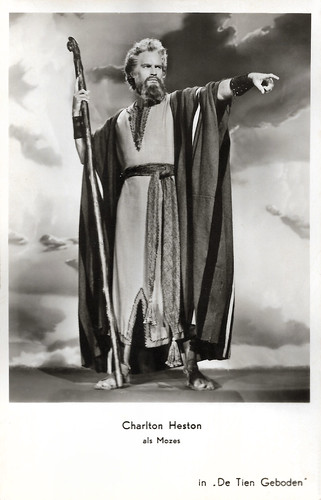
Dutch postcard by Gebr. Spanjersberg N.V., Rotterdam, no. 5183. Photo: Paramount. Publicity still for The Ten Commandments (Cecil B. DeMille, 1956) with Charlton Heston as Moses. Moses' robe was hand-woven by Dorothea Hulse, one of the world's finest weavers. She also created costumes for The Robe (Henry Koster, 1953), as well as textiles and costume fabrics for Samson and Delilah (Cecil B. DeMille, 1949), David and Bathsheba (Henry King, 1951), and other films.
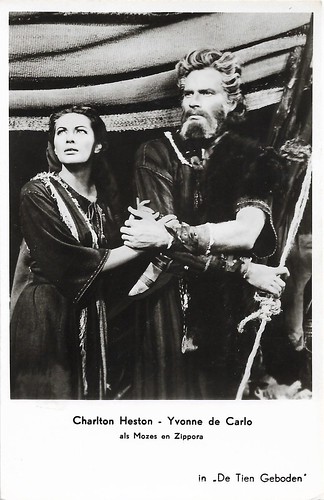
Dutch postcard by Gebr. Spanjersberg N.V., Rotterdam, no. 5184. Photo: Charlton Heston and Yvonne De Carlo in The Ten Commandments (Cecil B. DeMille, 1956), released in Dutch as De Tien Geboden.
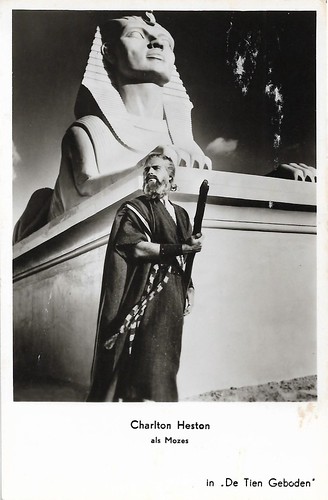
Dutch postcard by Gebr. Spanjersberg N.V., Rotterdam, no. 5185. Photo: Charlton Heston as Moses in The Ten Commandments (Cecil B. DeMille, 1956), released in Dutch as De Tien Geboden.
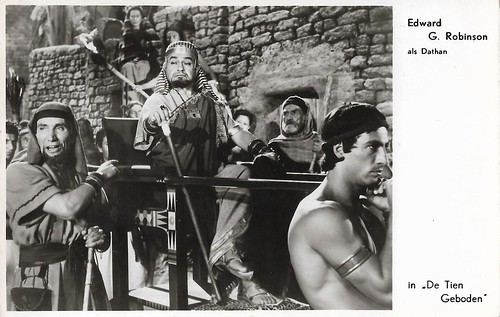
Dutch postcard by Gebr. Spanjersberg N.V., Rotterdam, no. 5187. Photo: Edward G. Robinson as Dathan in The Ten Commandments (Cecil B. DeMille, 1956), released in Dutch as De Tien Geboden.
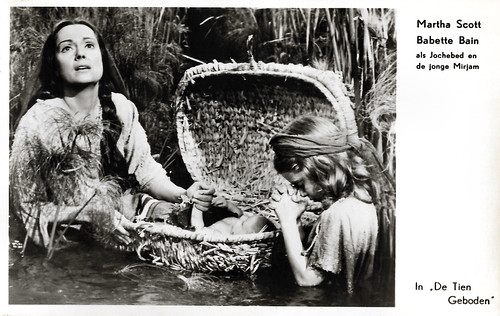
Dutch postcard by Gebr. Spanjersberg N.V., Rotterdam, no. 5190. Photo: Paramount. Martha Scott as Yochabel and Babette Bain as Little Miriam in The Ten Commandments (Cecil B. DeMille, 1956).
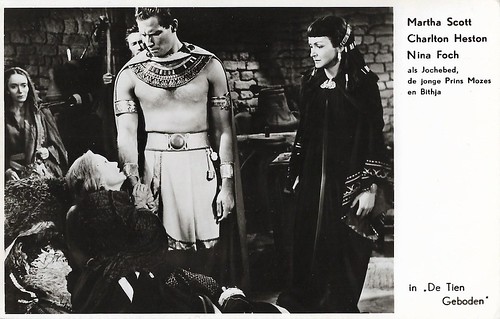
Dutch postcard by Gebr. Spanjersberg N.V., Rotterdam, no. 5193. Photo: Charlton Heston, Nina Foch, and Martha Scott in The Ten Commandments (Cecil B. DeMille, 1956), released in Dutch as De Tien Geboden.
Trailer The Ten Commandments (1956). Source: YouTube Trailers (YouTube).
Sources: Hal Erickson (AllMovie), John Preston (The Telegraph), Alex von Tunzelmann (The Guardian), Wikipedia, and IMDb.
No comments:
Post a Comment